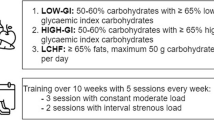Summary
The purpose of the present study was to examine the influence of a high carbohydrate diet on running performances during a 30-km treadmill time trial. Eighteen runners (12 men and 6 women) took part in this study and completed a 30-km time trial on a level treadmill without modifying their food intake (trial 1). The runners were then randomly assigned to a control or a carbohydrate (CHO) group. The CHO group supplemented their normal diets with additional carbohydrate in the form of confectionery products during the 7 days before trial 2; the control group matched the increased energy intake of the CHO group by consuming additional fat and protein. The mean (SEM) carbohydrate intake of both groups was 334 (22) g before trial 1, after which the CHO group consumed 566 (29) g · day−1 for the first 3 days and 452 (26) g · day−1 for the remaining 4 days of recovery. Although there was no overall difference between the performance times for the two groups during trial 2, the CHO group ran faster during the last 5 km of trial 2 than during trial−1 [3.64 (0.24) m · s−1 vs 3.44 (0.26) m · s−1 P < 0.05] . Furthermore, the 6 men in the CHO group ran the 30 km faster after carbohydrate loading [131.0 (5.4) min vs 127.4 (4.9) min;P < 0.05], whereas there was no such improvement in times of the men in the control group. Blood glucose concentrations of both groups decreased below pre-exercise values during trial−1 (P < 0.001), but only the control group had a decrease in blood glucose concentrations during trial 2 (P < 0.001). There were no differences between the concentrations of plasma catecholamines of the control group during the two trials. However, the adrenaline concentrations of the CHO group were lower (P < 0.05) during trial 2 than during trial 1, even though they ran faster during trial 2. These results confirm that dietary carbohydrate loading improves endurance performance during prolonged running and that confectionery can be used as an effective means of supplementing the normal carbohydrate intake in preparation for endurance races.
Similar content being viewed by others
References
Acheson KJ, Schutz Y, Bessard T, Anantharaman K, Flatt J-P, Jequier E (1988) Glycogen storage capacity and de novo lipogenesis during massive carbohydrate overfeeding in man. Am J Clin Nutr 48:240–247
Åstrand PO (1967) Diet and athletic performance. Fed Proc 26:1772–1777
Bergstrom JB, Hermansen L, Hultman E, Saltin B (1967) Diet, muscle glycogen and physical performance. Acta Physiol Scand 71:140–150
Brewer J, Williams C, Patton A (1988) The influence of high carbohydrate diets on endurance running performance. Eur J Appl Physiol 57:698–706
Brooks S, Burrin J, Cheetham ME, Hall GM, Yeo T, Williams C (1988) The responses of the catecholamines and B-endorphin to maximal exercise in man. Eur J Appl Physiol 57:230–234
Cohen L, Holliday M (1982) Statistics for Social Sciences. Harper and Row, London
Costill DL, Jansson E, Gollnick PD, Saltin B (1974) Glycogen utilization in leg muscles of men during level and uphill running. Acta Physiol Scand 91:475–481
Costill DL, Sherman WM, Fink WJ, Maresh C, Witten M, Miller JM (1981) The role of dietary carbohydrates in muscle glycogen resynthesis after strenuous running. Am J Clin Nutr 34:1831–1836
Coyle EF (1991) Timing and method of increased carbohydrate intake to cope with heavy training, competition and recovery. J Sports Sci 9 [Suppl]: 29–52
Dill DB, Costill DL (1974) Calculation of percentage change in volumes of blood, plasma and red cells in dehydration. J Appl Physiol 37:247–248
Galbo H, Holst JJ, Christensen NJ (1979) The effects of different diets and of insulin on the hormonal response to prolonged exercise. Acta Physiol Scand 107:19–32
Hultman E (1967) Studies on muscle metabolism of glycogen and active phosphate in man with special reference to diet. Scand J Clin Lab Invest [Suppl] 94:19
Karlsson J, Saltin B (1971) Diet, muscle glycogen and endurance. J Appl Physiol 31:203–206
Maughan RJ (1982) A simple rapid method for the determination of glucose, lactate, pyruvate, alanine, 3-hydroxybutyrate and acetoacetate on a single 20 μ blood sample. Clin Chim Acta 122:231–240
Nielsen B, Savard G, Richter EA, Hargreaves M, Saltin B (1990) Muscle blood flow and muscle metabolism during exercise and heat stress. J Appl Physiol 69:1040–1046
Paul AA, Southgate DAT (1978) The composition of foods. HMSO, London
Roberts KM, Noble EG, Hayden DB, Taylor AW (1987) Simple and complex carbohydrate-rich diets and muscle glycogen content of marathon runners. Eur J Appl Physiol 57:70–74
Savard G, Kiens B, Saltin B (1987) Central cardiovascular factors as limits to endurance; with a note on the distinction between maximal oxygen uptake and endurance fitness. In: Macleod D, Maughan R, Nimmo M, Reilly T, Williams C (eds) Exercise, benefits, limits and adaptations. Spon, London, pp 162–177
Sawka MN, Young AJ, Francesconi RP, Muza SR, Pandolf KB (1985) Thermoregulatory and blood responses during exercise at graded hypohydration levels. J Appl Physiol 59:1394–1401
Sherman WM, Costill DL, Fink WJ, Miller J (1981) Effect of exercise-diet manipulation on muscle glycogen and its subsequent utilization during performance. Int J Sports Med 2:114–118
Williams C, Nute MG, Broadbank L, Vinall S (1990) Influence of fluid intake on endurance running performance: a comparison between water, glucose and fructose solutions. Eur J Appl Physiol 60:112–119
Author information
Authors and Affiliations
Rights and permissions
About this article
Cite this article
Williams, C., Brewer, J. & Walker, M. The effect of a high carbohydrate diet on running performance during a 30-km treadmill time trial. Europ. J. Appl. Physiol. 65, 18–24 (1992). https://doi.org/10.1007/BF01466269
Accepted:
Issue Date:
DOI: https://doi.org/10.1007/BF01466269




